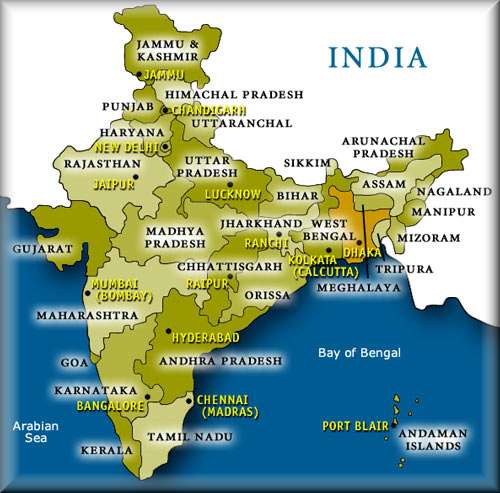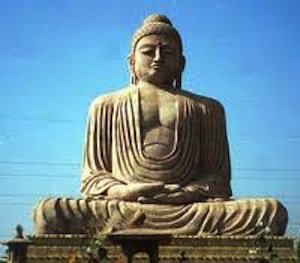Buddhism Originated in India
The Religion of Buddhism Originated in India
Did you know that Buddhism originated in India? You may not have thought of Buddhism when you thought of India, but you will after reading this page!
I too was surprised when I found out that Buddhism actually originated in the eastern part of the Indian subcontinent. This means that the religion of Buddhism was created in or near India.
Buddhism originated in India in the sixth century by a man named Siddhartha Gautama. Gautama is also referred to as Lord Buddha. The word Buddha means “one who has been awakened." There are arguments about the exact area in which Buddhism originated and no one knows the exact coordinates for certain. It is widely believed that Buddhism was born in Nepal, but some believe strongly believe otherwise.
Buddhists are the people who practice Buddhism. Buddhists believe that Siddhartha Gautama was not the first Buddha, nor that he was the last. They believe he was one of many great teachers who graced the earth, and that he will continue to do so.
A Buddha is really a person who is able to reach enlightenment and who, upon reaching enlightenment, receives the title of Lord Buddha. The Buddhist's religion is specifically based upon Gautama's teachings.
Buddhism, is the fourth largest religion in the world; Christianity, Islam, and Hinduism are the first, second and third most practiced religions. It is estimated that the Buddhist Religion has more than 370 million followers worldwide. Most followers of the Buddhist Religion live in Asia. In India today, only a small percentage of the population are Buddhists. This is interesting considering that Buddhism originated in India.
Like the religions of Hinduism and Jainism, Buddhism is a Dharmic religion. This means that its followers believe in Karma. So, what is Karma you ask? Karma is the belief that one's cumulative actions in life are taken into account and that those actions determine what someone will come back as in a later life.
The idea of dying an coming back to the earth as another life form is the concept of reincarnation. Followers of Dharmic religions (Buddhism, Hinduism, and Jainism) believe in reincarnation. A good way to think of reincarnation is that it is the belief that a soul is born into a body, that the soul lives and dies within that body, and that the soul is then is born again.
In some ways, Dharmic religions help to encourage good and kind behaviors of their followers. This is because the follower wants to come back in their next life as a noble life form, and they believe they must practice good karma in order to achieve that goal.
Buddhism Originated in India in this Depiction
Above, is a popular artistic depiction of Buddha that is often seen in Indian Art. Other popular depictions of Buddha around the world show him as a jolly heavy set man.
An interesting principal behind Buddhism is that Buddhists perceive the Dharmic Cycle of life as a form of suffering. So, Buddha's teachings offer his followers enlightenment. The idea of enlightenment is that a Buddhist learns all of the lessons and teachings in life through their numerous reincarnations and ultimately reaches full enlightenment.
This allows the Buddhist the opportunity to awaken from the cycle of reincarnation and to end their suffering by stopping there reincarnation cycle. Buddha teaches followers that if they live by Dharma, they can achieve "Nirvana", which is achievement of freedom from the reincarnation cycle.
Unlike most religions, Buddhism doesn't have a single sacred scripture that is followed by its various branches and traditions. Some Buddhist find certain texts to be cornerstones in the establishment of their religious values, while other branches do not. Today, the majority of Buddhists reside in Sri Lanka and many, many other Northern Asian countries.
Here are some of the popular Buddhist teachings:
The greatest achievement is selflessness.
The greatest worth is self-mastery.
The greatest quality is seeking to serve others.
The greatest precept is continual awareness.
The greatest medicine is the emptiness of everything.
The greatest action is not conforming with the worlds ways.
The greatest magic is transmuting the passions.
The greatest generosity is non-attachment.
The greatest goodness is a peaceful mind.
The greatest patience is humility.
The greatest effort is not concerned with results.
The greatest meditation is a mind that lets go.
The greatest wisdom is seeing through appearances.
Two things set Buddhism apart from other Indian Religions: The first is that Buddhists do not recognize or worship a god whatsoever; the second is that Buddha does not teach the existence of a human soul, just a spiritual soul.
It has two primary branches called Theravada and Mahayana. Theravada is the older and more dominant branch. It is very popular in South Asia and Sri Lanka. Mahayana is found mostly in Northern Asia. Both branches are strongest within the Asian continent, but can be found all over the world today.
Now you know that Buddhism originated in India!
Leave Buddhism to explore the other religions practiced in India
Visit our homepage to discover more of India




